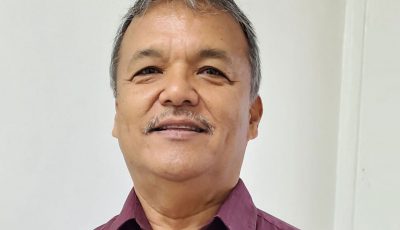TCGCC says it did not close Tinian Dynasty down
The Tinian Casino Gaming Control Commission said it is merely doing its job and shouldn’t be blamed for the impending closure of Tinian Dynasty Hotel and Casino later this month.
“While the commission understands the concerns of the Tinian leadership about the closure of the Dynasty, the commission is also very cognizant of its responsibility of ensuring that only suitable persons are given a casino license,” said TCGCC executive director Lucia Blanco-Maratita.
According to her, “the people of Tinian declared the following public policy: An integral and essential element of the regulation and control of casino facilities rests in the public confidence and trust in the credibility and integrity of the regulatory process and of casino operations—Gaming Act Public Policy No. 5.”
She said this means that until the suitability investigations are conducted and unless applicants are found suitable as per the Gaming Act, no casino license can be issued.
“We take our responsibility very seriously as we must ensure the integrity of the industry, the integrity of the persons and companies who will be operating a casino and the integrity of casino operations and the regulatory process,” she said.
Maratita said the integrity component is crucial especially in light of the history of the casino industry on Tinian, such as the criminal charges brought against the casino, the $75 million FinCEN fine, and delays in paying employees’ salaries, among others.
“The commission stands firm that it will do what it can to expeditiously process Chinese Strategic Holdings Ltd./TEC’s casino license application but will not compromise the strict regulatory process that must be adhered to,” she said.
Maratita also confirmed a Sept. 7 statement from the Tinian Mayor’s Office that Tinian Entertainment Co.’s casino license is substantially complete.
She pointed out, though, that more still needs to be done.
Before a suitability review commences, TEC’s application has to be deemed complete, Maratita said. At this point the application has been deemed substantially complete as of Sept. 4, 2015.
TCGCC pointed out in a statement that TEC and Chinese Strategic applications were supposed to submit their casino license application on Aug. 24 this year, but instead submitted it on Sept. 3, while documents that were required on Sept. 4 are still pending as of Monday, Sept. 7.
“At this point, if the applicants comply and pay the investigative fees by the deadline of Sept. 9 [today], investigators will be able to conduct their interviews of the applicants and review all necessary records of the entities in Hong Kong this month. Once TCGCC receives the investigators’ preliminary report, and if the applicants are found suitable by TCGCC based on that preliminary report, Chinese Strategic and TEC will be given an interim casino authorization while suitability is being completed,” Maratita said.
She noted that if at the end of all the suitability review—including a review of company’s business plan, financial ability, ability to successfully operate a casino with integrity, among others—TCGCC finds that all parties are “suitable” under the requirements of the Gaming Act, then they will be granted a casino license.
TCGCC explains position on Dynasty
The TCGCC statement also stated: “Much has been rumored as to the reason why the casino at the Dynasty was closed or why the entire property may be closing. Much blame has been placed on TCGCC.”
“This blame has been the result of much misinformation and lack of understanding on the role of the commission versus the role of politicians. The public has been misled by the politicians’ lack of understanding of the true nature of the job of regulating the casino industry.”
“Let’s start with basic truths—Mega Stars and Hong Kong Ent. president Wai Chan have never been authorized to operate the casino. And that if the applicants have all been cooperative with the commission from the very beginning, the casino license or the interim casino authorization could have been issued over a year ago, assuming they would have been found “suitable,’” TCGCC stated.
TCGCC says that on April 25, 2013, when federal agents raided the Dynasty on its 15th anniversary, it happened because it did not follow federal laws.
“They did not file Cash Transaction Reports and Suspicious Activity Reports. The raid is not the commission’s fault because federal law enforcement is the job of the feds. As a result of this raid, the company and two of its employees were indicted, resulting in plea agreements, a settlement agreement, millions of dollars in penalties, and the largest FinCEN fine ever imposed on a casino,”
“Shortly after this raid, in July 2013, to be exact, Mega Stars and Chan came to the commission and told us they wanted to invest in the Dynasty. The commission was very receptive to the new investors, especially at a time when the Dynasty was nine payrolls behind in salaries,” TCGCC explained.
Mega Stars and Chan were told “…before they invest in the Dynasty, they must comply with the Gaming Act, they must submit an application for a casino license, they must be found suitable, they must pay required fees and then, only if they meet the suitability requirements under the Gaming Act will they be allowed to invest and participate in the casino.”
TCGCC continued to give the message, “yet they went ahead and started pumping money into the Dynasty.” Chan then became president and chairman of HKE. From July 2013 until April 30, 2014, Chan refused to submit needed applications and refused to cooperate.
It failed to meet requirements because it insisted on revising TCGCC’s forms. In May 2014, TCGCC returned the application and fees to HKE. HKE resubmitted an acceptable application on June 2, 2014. “Their application was not complete…additional documents other than initial filings are usually required.”
“It became very evident there were other entities and persons involved in the Dynasty deal. It is here at this juncture, in latter part of 2014, when the involvement of Chinese Strategic Holdings and its subsidiaries, TEC, surfaced.”
TCGCC learned about it and their involvement without approval of TCGCC, and were told to submit their casino license applications.
In February 2015, Chan informed the commission that he didn’t wish to proceed with the acquisition of the Dynasty. “He refused to respond to inquiries, refused to cooperate, refused to submit any more documents or information, and refused to pay fees due in order to continue his suitability investigations.”
Chinese Strategic and TEC finally submitted their applications in February 2015. “However, because since mid-2013, the parties had been entering into various agreements, it became obvious that much work was needed to review all the agreements in order to determine if they would be acceptable by the commission.”
The Gaming Act requires this before anyone enters into any agreement involving the casino. “There also came an enormous amount of instruments, agreements, and leases that were executed, ignoring basic tenet of the Gaming Act—the suitability requirement—that one must be found suitable ‘before’ one is allowed to manage, influence or control a casino on Tinian.
“Yet from time Chinese Strategic and TEC submitted their applications, even though the applications were far from being deemed complete, they set unreasonable deadlines for issuance of their casino license. They wanted the casino license without even going through the suitability review.
“Again, just because an applicant submits the initial application and required information does not mean, ‘that’s it.’ If more documentations were needed, they will have to supply those information.
“Maratita, in conjunction with the investigators, determine what additional documents and information will be needed. The bottom line is, if applicants want to obtain a casino license, they have to comply,” TCGCC said.
In an effort to accommodate the parties’ desire putting the suitability process on a fast-track basis, a Memorandum of Understanding was executed between Chinese Strategic, TEC, HKE, and TCGCC on July 1, 2015.
“This MOU specifically requires that the applications pay the license application fees, submit any additional documents or information needed, and then the commission will expedite their application and suitability review process,” TCGCC said.
TCGCC gave an example such as the CNMI Bureau of Motor Vehicles. “BMV will not just hand you a driver’s license; you have to apply, pay the fees, prove that you know how to drive, pass a driver’s written and driving test, pass an eye test, etc. Only if you meet their requirements would you receive a driver’s license,” TCGCC added.



























